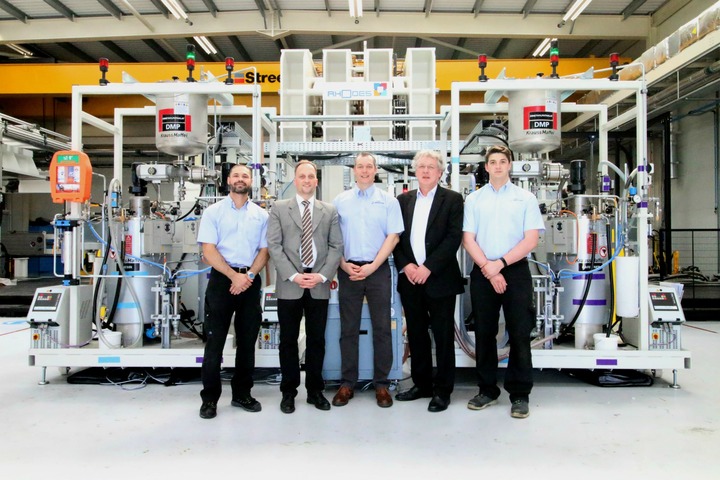The AMRC announces its unique KraussMaffei high-pressure RTM system and composite press facility is ready for collaborative R&D projects
02 May 2018The Composite Centre at the University of Sheffield’s Advanced Manufacturing Research Centre (AMRC) has announced its unique high-pressure RTM and composite press facility is now ready to host collaborative R&D projects with interested manufacturers from the composites industry.
The bespoke KraussMaffei RimStar Compact is the most advanced High-Pressure Resin Transfer Moulding (HP-RTM) system operational within a UK research institution and is being used by the AMRC to support its research into developing novel composite technologies.
The facility is a world first in terms of its size, capabilities and the level of monitoring and control it can provide the AMRC Composite Centre.
The system comes complete with unique dual resin feeds and mixing heads; where the resin and hardeners are mixed at the impingement head - located in a closed, matched mould - under a high-pressure colliding process to be instantaneously injected into the preform.
The multiple heads mean resin flow rate is higher and large, but lightweight net-shape parts can be achieved with the maximum amount of resin input.
AMRC Composite Centre Research Engineer, Darren Wells said: “This unique feature of the system allows us to extend the range of highly reactive, but fast acting resins and hardeners we work with; giving us greater flexibility to conduct research with novel or unusual composite materials and produce more complex geometric component structures.
“These highly reactive resins are being used more frequently within HP-RTM techniques and have made it possible for us to bring cure times down to within three minutes. This dramatic reduction opens up the potential for manufacturers to take advantage of huge savings in turnaround times.”
A UK manufactured press with two separate lower platens that allow for both heated and cooled processes complete the system. Their large working envelopes can be adapted for more complex tooling geometries and will open up opportunities for manufacturers where high customisation, but high-volume production is required.
“There are wide-ranging benefits of using this new system in our research, which include improved processing times and cost, but also improved use of raw materials as no pre-preg, or ‘pre-impregnated’ composite material is required,” said Darren.
Today, industry uses simple ‘preforms’ of composite material which are impregnated with polymer resin and cured to create composite material.
“On our bespoke KraussMaffei high-pressure RTM system, the injecting and curing of composites all happens in the same mould, which means parts are structurally sound and consistent in quality and material characteristics,” he added.
“This means there is a higher repeatability of the process, as it removes the variability of quality within pre-preg materials that stems from the laying and curing processes.
“Often pre-preg additives are used to improve toughness during composite curing processes, especially for safety critical or structural composite components, but the viscosity is too high to inject under HP-RTM processes; so we are looking at lower viscosity additives and how they are mixed into the resin or preform so they don’t disrupt fibre layout.”
The AMRC Composites Centre now has the capacity for a variety of research collaborations to utilise this cutting edge high-pressure composite facility.
“There are huge areas for potential growth in using composite technologies for many sectors as HP-RTM is ideal for manufacturing integrated, lightweight structures with extremely fast cycle times,” said Darren.
“The KraussMaffei system provides us with immense machine flexibility thanks to its modular design, allowing us to tailor its configuration to specific customer requirements. This enables a wide range of UK manufacturers the opportunity to exploit the advantages HP-RTM processes have to offer such as improved through-put and cost savings,” he added.
“We are looking forward to our future relationship and development programs with the AMRC,” said Stephen Lambert, RPM Business Manager KraussMaffei Group UK. “Particularly in the area of aviation, where we see great potential for HP-RTM composite components. As a result of a recent AMRC automotive development program using the KraussMaffei supplied HP-RTM equipment, KraussMaffei has received a serial volume production order for a HP-RTM metering from a UK based performance vehicle manufacturer.”
To AMRC Composite Centre can be reached at compositecentre@amrc.co.uk or +44 (0)114 222 1747.
Photo caption: (l-r) AMRC Development Engineer, Davide Melis, KraussMaffei’s Head of R&D and Process Technology RPM Division, Sebastian Schmidhuber, AMRC Research Engineer, Darren Wells, KraussMaffei’s RPM Business Manager UK, Stephen Lambert and AMRC Composites Technician, Ricky Rowett.

